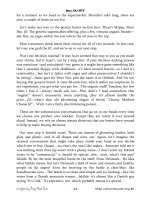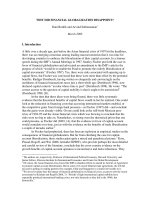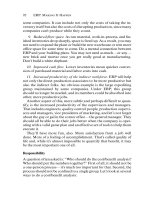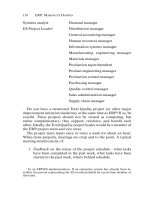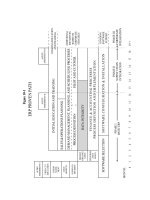Why Did It Happen
Bạn đang xem bản rút gọn của tài liệu. Xem và tải ngay bản đầy đủ của tài liệu tại đây (101.18 KB, 10 trang )
Y
ou are an hour and a half late to work. The moment you walk through the door, your boss calls you
into his office. “Where have you been?” he asks. “I demand an explanation.”
Explanations are very closely related to arguments, but they’re not quite the same thing. Whereas an argu-
ment generally aims to convince you that a certain claim is true, an explanation aims to convince you why a claim
is true. For example, compare the following examples:
1. You should be more careful going down these stairs. They’re steep and lots of people fall.
2. He fell down the stairs because they’re very steep and he wasn’t careful.
The first example is an argument. The writer is trying to convince you to be more careful on the stairs (conclu-
sion) because the steps are steep (premise) and lots of people fall (premise). The second example, on the other
hand, is an explanation. The writer here is telling you why someone fell down the stairs—because they’re steep
and because he wasn’t careful.
LESSON
Why Did It
Happen?
LESSON SUMMARY
In this lesson, you’ll learn how explanations are different from argu-
ments. You’ll also learn the criteria for determining whether the expla-
nation you’re being offered is good or not.
14
93
So explanations are different from arguments.
But what does this have to do with critical thinking and
reasoning skills?
Well, just as you will be presented with argu-
ments of all types almost every day of your life, you will
also be presented with explanations of all kinds. And
just as you need to evaluate arguments carefully before
you decide whether or not to accept them, you should
also evaluate explanations carefully before you decide
whether or not they’re valid.
When it comes to explanations, there are four
criteria that you should look for:
1. Relevance
2. Testability
3. Circularity
4. Compatibility with existing knowledge
Relevance
One of the first tests any explanation should undergo
is the test for relevance. Is the explanation that is pro-
vided clearly relevant to the issue being explained?
That is, is there a clear and obvious connection between
the issue and the explanation?
For example, you might say to your boss, “I’m late
because the electricity went off during the night and my
alarm never went off.” Is that relevant? Absolutely. Your
ability to arrive on time depends upon your ability to
wake up on time. However, an explanation like the fol-
lowing is certainly not relevant:
“I’m late because Macy’s is having a sale this
weekend.”
Macy’s sale—while it may be important to you—has no
bearing on your ability to get to work on time. This is
obvious, of course, but that doesn’t prevent people
from offering irrelevant explanations.
Practice
1. Provide another relevant and another irrelevant
reason for being late to work.
Relevant:
Irrelevant:
Answers
1. Answers will vary. You might have written some-
thing like the following:
Relevant: My car broke down and I had to wait
an hour for the tow truck.
Irrelevant: I need a new car radio.
One important thing to keep in mind about
explanations is that an explanation can pass the rele-
vancy test and still not be a good explanation. For
example, “I’m late because last night I was at a Super-
Bowl party” is not a good explanation, but it is a rele-
vant explanation—because you were out late, you
didn’t get up in time for work.
Practice
Read the following explanations carefully. Are they rel-
evant (R) or irrelevant (I)?
____ 2. I didn’t go because it was snowing heavily
outside.
____ 3. I didn’t get accepted into the program because
I didn’t get my application in on time.
____ 4. I didn’t make it to practice because my favorite
shoe store was having a grand opening in my
neighborhood.
–
WHY DID IT HAPPEN?
–
94
Answers
2. R. Bad weather is a relevant explanation for not
going somewhere. Snow can affect the driving
conditions and make it dangerous to go any-
where.
3. R. Not getting an application in by a deadline is a
relevant explanation for failing to get accepted
into a program.
4. I. The grand opening of a shoe store is not a rel-
evant explanation for not making it to prac-
tice.
Testability
You may not be a scientist, but you’ve certainly per-
formed some experiments in your life. You may have
bought different brands of detergent, for example, to
see which brand got your clothes cleaner. Or you may
have tried different cold medicines to see which worked
best for you. This type of experimenting enables you to
explain why you use the brand you use: “I use Rinse-All
because it doesn’t bother my sensitive skin,” for exam-
ple. This explanation is one that can be tested. It there-
fore passes the next test of validity for explanations:
testability.
Testability is as important as relevance when it
comes to evaluating explanations. If someone pro-
vides an explanation that is impossible to test, then
you should be highly suspicious. An untestable expla-
nation is one that is impossible to verify through
experimentation. And that’s precisely why you should
be on guard.
For example, imagine that someone offers you the
following explanation:
Global warming is caused by invisible, weightless
particles being hurled at us from an invisible
universe.
Is there any way to test this explanation? If the particles
can’t be seen or weighed, and if the universe they come
from is invisible, then no one can prove that this is or
isn’t the cause. It can’t be verified and it can’t be refuted.
The theory is untestable (and absurd, but that’s another
story).
Here’s another example:
We met because we were meant to meet.
Is there any way to test this explanation? No. There’s no
test for fate, after all. Though it may be romantic, this
is an untestable—and therefore invalid—explanation.
Practice
Read the following explanations carefully. Are they
testable (T) or untestable (U)?
____ 5. You won the competition because it was in the
stars.
____ 6. I got the job because I had all the qualifica-
tions they were looking for.
____ 6. You were given that item because you no one
else showed up to claim it.
____ 7. You didn’t get hurt because luck was on
your side.
Answers
5. U. There’s no way to verify that something
happened because it was “in the stars.
6. T. This can be verified. You can ask your
employer why he or she chose you for the job.
7. T. This can be verified. You can find out if
anyone else went to claim the item.
8. U. There’s no way to verify if luck is ever on any-
one’s “side.”
–
WHY DID IT HAPPEN?
–
95
Circularity
In Lesson 12, “Logical Fallacies: The Impostors,” you
learned about circular reasoning: arguments that dou-
ble back on themselves because the conclusion and the
premise say essentially the same thing. Explanations can
be circular, too. You might say to your boss, for example:
I’m late because I didn’t get here on time.
That’s a
circular explanation
. “I’m late”and “I didn’t get
here on time” say essentially the same thing. The “expla-
nation”simply restates the situation rather than explains it,
and that doesn’t make for a valid explanation.
Here’s another example:
The inflation was caused by an increase in prices.
Notice that “inflation” and “increase in prices” are
essentially the same thing. Once again, this is an expla-
nation that goes in a circle. The explanation does not
offer any insight as to how or why the situation
occurred.
Practice
Read the explanations below carefully. Identify expla-
nations that pass (P) the logic test and those that fail (F)
because they are circular.
____ 9. He has insomnia because he has trouble
sleeping.
____10. She’s a genius because she’s gifted.
____11. They work well together because they share
the same goals.
____12. He keeps the birds in separate cages because
he doesn’t want to keep them together.
____13. He got sick because he didn’t dress warmly
enough.
Answers
9. F. “Insomnia” and “has trouble sleeping” are two
ways of saying the same thing.
10. F. Being a genius and being gifted are just about
the same, so there’s no real explanation given
here.
11. P. This explanation gives a reason that explains
why they work well together.
12. F. A good explanation would tell why the birds
can’t be kept together.
13. P. This gives a reason for why he got sick.
More Practice
Write two circular explanations of your own on a sep-
arate sheet of paper. To see if they’re really circular, use
this test: Does the explanation (usually the part that
comes after the word because) really express the same
idea as the issue you’re supposed to be explaining?
Compatibility with Existing
Knowledge
Your boss didn’t like your “I’m late because I didn’t get
here on time” explanation, so you try again:
“I’m late because my helicopter is in the shop
and I had to find another way to get here.”
Chances are, your boss won’t find your explanation
very amusing—and he definitely won’t find it valid.
Why? Because he knows that there’s no way you get to
work by helicopter. You get to work by car, bus, train,
or some other means of transportation, but not by
helicopter. Your explanation goes against what he
knows to be true, so he has every right to be very sus-
picious of your explanation.
Scientific discoveries and technological break-
throughs often surprise people and sometimes shatter
theories that were long thought to be true. Remember,
people once believed that the Earth was flat. Still, in
everyday life, it’s a good idea to be wary of explana-
tions that go against what you know from your past
–
WHY DID IT HAPPEN?
–
96
experience or from your education. For example, if
you know that the office copier was just fixed this
morning, and your assistant says she didn’t finish the
copies you requested because the copier is broken, you
have good reason to doubt the validity of her explana-
tion. Similarly, if your neighbor tells you that gravity is
actually caused by a giant U-shaped magnet located at
the center of the Earth, you should be highly suspicious
since his explanation conflicts with accepted scientific
theories about the makeup of the Earth’s interior.
Some explanations, however, may sound odd or
surprising to you without necessarily contradicting
what you know from your experience or education. In
this case, it’s probably best to suspend your judgment
anyway, until you can verify the explanation. Like ten-
tative truths, these explanations might be valid, but
you need to learn more before accepting them as true.
For example, imagine you are the boss and an
employee tells you, “I’m late because there was a major
accident on the freeway.” Now you know that things like
this happen. Depending upon the credibility of that
employee, you could:
■
Accept that explanation as fact
■
Accept that explanation as a tentative truth
■
Reject the explanation, especially if that employee
has a history of lying
In a case like this, the credibility of the person
offering the explanation is a key factor. But it’s impor-
tant to note that this is not an untestable explanation.
You could listen to traffic reports on the radio, talk to
other employees who take that freeway, or watch for a
report of an accident in tonight’s paper to find out if the
employee was telling the truth.
Practice
Consider the following explanations and their sources.
Are they acceptable? Why or why not?
14.
Your long-time coworker and friend says: “I’m
sorry I can’t cover your shift tomorrow. I have a
doctor’s appointment and I can’t reschedule again.”
15. Your local garage mechanic says: “Your car broke
down because your transmission is shot. It’s
going to need a lot of work.”
16. Your neighbor says: “I don’t exercise because it’s
bad for your health. It wears your body down.”
Answers
14. If you’ve worked with this person a long time and
consider her a friend, then this explanation is
acceptable.
15. The acceptability of this explanation would
depend partly upon how much you know about
cars. A ruined transmission is a very costly repair.
If you don’t know much about cars and don’t
know your mechanic very well, it might do you
good to get a second opinion.
16. Unacceptable. All evidence points to exercise as a
key to improving health and living a longer life.
In Short
Explanations, much like arguments, need to meet cer-
tain criteria before you should feel comfortable accept-
ing them. To be valid, an explanation should be
relevant—clearly related to the event or issue in
question—and testable—able to be verified in some
way. Circular explanations—ones that double back
on themselves like circular arguments—should be
rejected, and you should be careful about accepting
explanations that contradict your knowledge or
accepted theories.
–
WHY DID IT HAPPEN?
–
97
